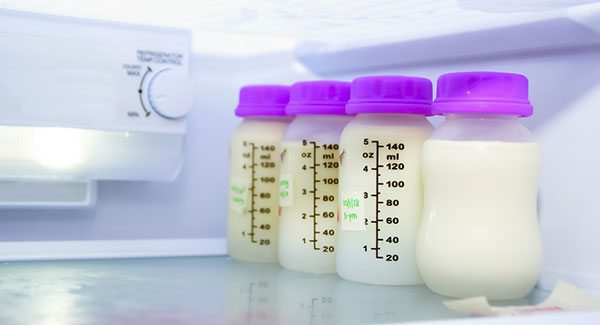
For nursing mothers who work, exclusive breastfeeding can be difficult. This is why pumping &storing breastmilk for use at a later time is a good idea. However, there are dos & don’ts for breastmilk storage so please read this article to find out.
1. What container should you use to store expressed breastmilk?
Before expressing or handling breastmilk, wash your hands with soap and water. Then store the expressed milk in a clean, capped glass or hard plastic, BPA-free container. BPA stands for bisphenol A, a chemical used to make certain plastics and resins since the 1960s. Some research has raised health concerns about BPA because it can seep into food or beverages from BPA-made containers.
You can also use plastic bags specifically designed for breastmilk storage but don’t store breastmilk in disposable bottle liners or plastic bags designed for general household use.
2. What’s the best way to store expressed breastmilk?
Using waterproof labels and ink, label each container with the date you expressed the breast milk and place the containers in the back of the refrigerator or freezer, where the temperature is the coolest. Store the milk temporarily in an insulated cooler if you don’t have a refrigerator or freezer.
Fill individual containers with the milk your baby will need for one feeding. Also, breast milk expands as it freezes, so don’t fill containers to the brim.
3. Can you add freshly expressed breastmilk to already stored milk?
You can add fresh milk to the refrigerated milk you expressed earlier on the same day. However, thoroughly cool the freshly expressed breastmilk before adding it to previously chilled or frozen milk.
Don’t mix warm and frozen breastmilk because it will cause the frozen milk to thaw partially.
Suggested read: Recurrent Breastfeeding Questions New Moms Ask (Part 2)
4. How long can you keep expressed breast milk?
This depends on the breastmilk storage method but consider these guidelines:
a. Room temperature. Freshly expressed breast milk can be kept at room temperature for up to six hours. However, use or proper storage within four hours is optimal.
b: Insulated cooler. Freshly expressed breast milk can be stored in an insulated cooler with ice packs for up to one day.
c: Refrigerator. Freshly expressed breast milk can be stored in the back of the refrigerator for up to five days in clean conditions. However, use or freezer storage within three days is optimal.
d: Deep freezer. Freshly expressed breast milk can be stored in the back of a deep freezer for up to 12 months. However, using frozen milk within six months is optimal.
Keep in mind research suggests that the longer you store breast milk—whether in the refrigerator or the freezer—the greater the loss of vitamin C in the milk.
It’s also important to note that breast milk expressed when a baby is a newborn won’t completely meet the same baby’s needs when he or she is a few months older. Also, storage guidelines might differ for preterm, sick, or hospitalised infants.
5. How do I thaw frozen breastmilk?
Thaw the oldest milk first. Place the frozen container in the refrigerator the night before you intend to use it. You can also gently warm the milk by placing it under warm running water or in a warm bowl of water.
Also, don’t heat a frozen bottle in the microwave or too quickly on the stove. Some parts of the milk might be too hot, and others cold. Some research suggests that rapid heating can affect the milk’s antibodies.
While further research is needed on whether previously frozen milk that’s been thawed can be frozen again and safely used, many experts recommend discarding thawed milk that isn’t used within 24 hours.
6. Does thawed breastmilk smell or look different from fresh breast milk?
The colour of your breastmilk might vary, depending on your diet. Also, thawed breast milk might seem to have a different odour or consistency than freshly expressed milk. It’s still safe to feed though.
However, if your baby refuses the thawed milk, it might help to shorten the storage time.
Hope you learned something new about breastmilk storage. Please share with parents you know, particularly nursing mothers who also have to juggle their jobs with feeding their babies.
Also read: What Cereals Are Safe For Babies?
References
CDC.gov: https://www.cdc.gov/breastfeeding/breast-milk-preparation-and-storage/handling-breastmilk



